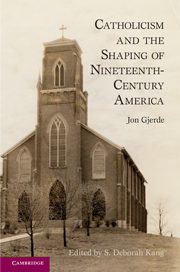Book contents
1 - The Protestant Conundrum
Published online by Cambridge University Press: 05 June 2012
Summary
The ideas of Christianity and liberty are so completely mingled that it is almost impossible to get [Americans] to conceive of the one without the other.
Alexis de Tocqueville, 1835Supreme Court Justice Joseph Story would have agreed with Alexis de Tocqueville that nineteenth-century Americans commonly associated their political freedoms with the Christian religion. Story, whose tenure on the Court spanned thirty-some years, had a wide-ranging legal career (see Fig. 2). A longtime opponent of slavery, he wrote the majority decision in the celebrated Amistad case in 1841. Beginning in 1832, he played an active role in fostering the School of Law at Harvard College, one of the first professional law schools in the United States. He is perhaps best known, however, for his multivolume commentary on the United States Constitution in 1833, which aptly illustrates what we might label “Story’s Dilemma,” a tension in antebellum American society that arguably has not been resolved entirely even today. On the one hand, Story celebrated the clause in Article VI that declares that “no religious test shall ever be required as a qualification to any office or public trust under the United States.” This clause, Story argued, was not “introduced merely for the purpose of satisfying the scruples of many respectable persons who feel an invincible repugnance to any religious test or affirmation.” Rather, it also had “a higher object, – to cut off forever every pretence of any alliance between church and state in the national government.” Story also lauded the First Amendment, which proscribed Congress from enacting any law that established religion or prohibited its free exercise, because rights of conscience were “beyond the just reach of any human power;” there were rights “given by God, and cannot be encroached upon by human authority without a criminal disobedience of the precepts of natural as well as revealed religion.” Like many Americans, Story marveled at the advances of his young nation in avoiding religious proscription, fostering freedom of belief, and enabling the rights of conscience, which he deemed essential not only for proper religious observance but also for appropriate behavior in the state and society.
- Type
- Chapter
- Information
- Publisher: Cambridge University PressPrint publication year: 2011



